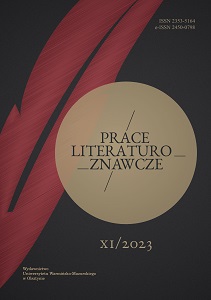Anstelle einer Autobiographie? Schreiben über die Shoah in Stanisław Lems Apokryfy
Instead of an Autobiography? Writing about the Shoah in Stanisław Lem’s Apokryfy
Author(s): Alfred GallSubject(s): Polish Literature, WW II and following years (1940 - 1949), Theory of Literature, Sociology of Literature
Published by: Wydawnictwo Uniwersytetu Warmińsko-Mazurskiego w Olsztynie
Keywords: Stanisław Lem; autobiography; paratextuality; critical theory; Shoah;
Summary/Abstract: This paper focuses on Lem’s transition from autobiographical writing to paratextual discourses. This shift is discussed as reaction to the delegitimized position of the subject, especially after the Shoah and wartime experiences. When Lem deals with wartime experiences he doesn’t resort to autobiographical writing and, hence, won’t write a sequel to the self-portrait about his childhood and adolescence in Wysoki Zamek (The High Castle, 1966). Instead, the writer creates in some of his works paratextual narratives that reflect the new, distorted subjectivity which emerged in the aftermath of the Shoah. With this rupture of civilisation in mind Lem’s paratextual writing represents a criticism of subjectivity as well as the autobiographical foundations in memoirs. In his approach Lem outlines the profile of a modern subjectivity that echoes the critical reassessment of the subject in Critical Theory (Adorno, Horkheimer, Marcuse). This article tries to shed some light on this intriguing correspondence and attempts to highlight Lem’s understanding as well as literary practice of post-autobiographical writing about the subject.
Journal: Prace Literaturoznawcze
- Issue Year: 2023
- Issue No: 11
- Page Range: 9-25
- Page Count: 17
- Language: German

